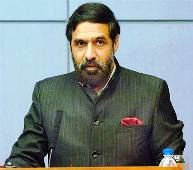 Negotiations for the ambitious free trade agreement between India and the 27-nation economic bloc of the European Union are likely to be wrapped up by early next year.
Negotiations for the ambitious free trade agreement between India and the 27-nation economic bloc of the European Union are likely to be wrapped up by early next year.The talks, on from June 2007, are now progressing well.
Commerce and industry minister Anand Sharma had earlier said the negotiations would conclude by October.
"The talks have picked up significantly in the last three months and in some difficult issues, the talks are moving fast . . . We hope to close the deal by early 2011," a senior commerce department official told Business Standard.
Next week, Sharma would be having another round of negotiations with the EU's trade commissioner, Karel De Gucht. So far, 10 rounds of negotiations have taken place.
Earlier this week, commerce secretary Rahul Khullar met EU director-general for trade David O'Sullivan to review the progress so far. Several differences mired the process over EU's insistence on including social issues such as human rights, labour policies and climate change within the FTA purview.
Both countries have also been engaged in a dispute concerning seizure of drugs by EU customs authorities, which induced India to move the Wolrd Trade Organisation's disputes settlement panel.
They were asked to resolve the matter bilaterally, with help from the consultation process.
When any WTO member wants to invoke the provisions of the dispute settlement mechanism, a consultation process is initiated.
If the trading partners are unable to settle the dispute, a panel to hear the case is set up, with the decision binding on both parties.
According
The commerce department would be preparing a progress report by that time prior to the Prime Minister's visit.
"We are trying to work out a solution that provides us comfort that indeed they are able to derive a solution and there will be no such seizures. Then, we will have the consultations closed," the official said.
The EU has to amend its patent laws in relation to European Commission's Regulation 1383/2003, that mandates its members, on grounds of suspicion, to detain shipments containing pharmaceutical products during transit through the EU destined for developing countries.
The imbroglio started in October 2008, when a shipment of drugs meant for blood pressure ailments, produced by Ind-Swift Labs Ltd, was seized by the Dutch customs authorities during transit to Colombia.
The Dutch said these were counterfeit drugs, based on their reading the relevant law. Seized drugs have been manufactured by firms such as Ind-Swift, Cipla, Dr Reddy's, Aurobindo Pharma and Macleods Pharma, meant for AIDS, Alzheimer's and blood pressure.
Image: Anand Sharma








 © 2025
© 2025